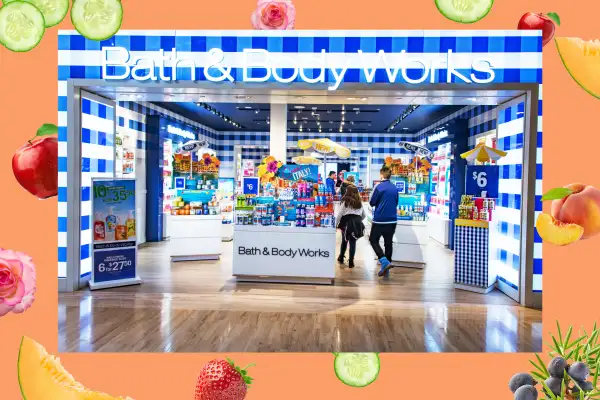Bath & Body Works Will Never Die. Here’s Why the ’90s Mall Staple Is Still So Profitable

You know about “dead malls,” right? Those crumbling relics of the shopping world pre-“retail apocalypse?”
The woes of brick and mortar retailers aren’t over yet: More U.S. stores shuttered in the first four months of 2019 than all of 2018, according to Coresight Research. But in many of those eerie old malls, there’s at least one store that’s managed to keep the lights on. And oftentimes, that store is a Bath & Body Works.
We’re in the golden age of “natural” skincare and “fragrance-free” beauty; of $200 facial oils and $2,000 tubs of moisturizer. And yet, women are still hurling cash at a company that sells spiced gingerbread body wash and donut-scented hand soap. And I mean HURLING: Just last month, parent company L Brands announced Bath & Body Works’ sales were up 15% from last year.
As iconic mall brands like Payless and Charlotte Russe close their doors for good, how is Bath & Body Works—and its $12 bottles of saccharin-sweet lotions—soldiering on?
Mostly, experts say, because it smells amazzzzing in there.
“Scent is an important, emotional thing for consumers,” says Larissa Jensen, beauty business analyst at NPD Group. “It brings back memories. It’s personal.“
Female shoppers put a lot of thought into what they want their bodies and homes to smell like, Jensen says. We want to be the person who wears coconut verbena perfume, or who’s kitchen smells like vanilla. Bath & Body Works sells candles, hand soaps, and body care items — everything you need to self-actualize into the fragrant, put-together lady you’ve always dreamt of becoming.
Bath & Body Works brings out our sentimental side, too. We’re hardwired to gravitate to the scents that remind us of our childhood, Jensen says, and what’s more nostalgic than a whiff of cucumber melon hand lotion? Or juniper breeze body spray? And even if you’re not the type to follow your nose into a body wash store like a Scooby Doo GIF, your daughter probably is.
"Wanting a candle that smells like cinnamon buns is a part of being 12," Jensen says.
Bath and Body works declined to speak to me for this story, or to give demographic information on its customers. But research shows that personal care products—moisturizers, bath bombs, face masks—are more popular than ever, and young shoppers are leading the charge.
“Millennials are looking for moments of ‘self care’, and moments of escape,” says MaryLeigh Bliss, a youth insights expert at the research firm Ypulse. “And beauty and personal care brands are reaping the rewards.”
Ypulse tracks “brand affinity” through annual surveys that reach about 80,000 people ages 13 to 39. Young upstarts and “Instagram brands” like Glossier are wildly popular these days, but Bath & Body Works continues to top Ypulse’s rankings — as of this writing, only Dove ranks higher among consumer’s favorite personal care brands, Bliss says.
People trust Bath & Body Works. And while consumers are buying more stuff online, they still want to touch, smell, and sample the products they put on their skin. That’s why stores like Sephora give out "testers" of every single product, and why Glossier, a shining star in the direct-to-consumer space, just opened up a retail flagship in New York.
Bath & Body Works has a giant retail footprint — 1,630 U.S. stores at last count. Last year, as competing mall brands like Sears and Davids Bridal filed for bankruptcy, the company opened dozens of new stores.
Compare that to Victoria’s Secret, the other household name in L Brand’s portfolio.
As lingerie sales move online, and companies like Aerie emphasize inclusivity and a broader range of sizes, Victoria's Secret has stuck to its guns. Its “angels” are still rail thin, and its bras and panties still emphasize sex appeal over comfort. It's been a losing strategy: VS has seen declining sales for the last 10 quarters, and has closed more than 80 U.S. stores over the last two and a half years, filings show. The lingerie brand is doing so poorly compared to Bath & Body Works that Barington Capital Group, which has a stake in L Brands, is urging the parent company to split from Victoria's Secret altogether.
Bath & Body Works has mostly transcended retail fads. Some stores have gotten a redesign, ditching the picnic basket aesthetic for a sleek, minimalist look. And the company has brought in plenty of new products — it sells bath bombs and face masks like everybody else now.
But while the rest of the personal care industry doubles down on “clean beauty,” and every company from Goop to Target jumps on the paraben-free bandwagon, Bath & Body Works is still selling many of the same saccharin-sweet lotions it always has. Unlike pushup bras and lace thongs, women still want to buy them.
